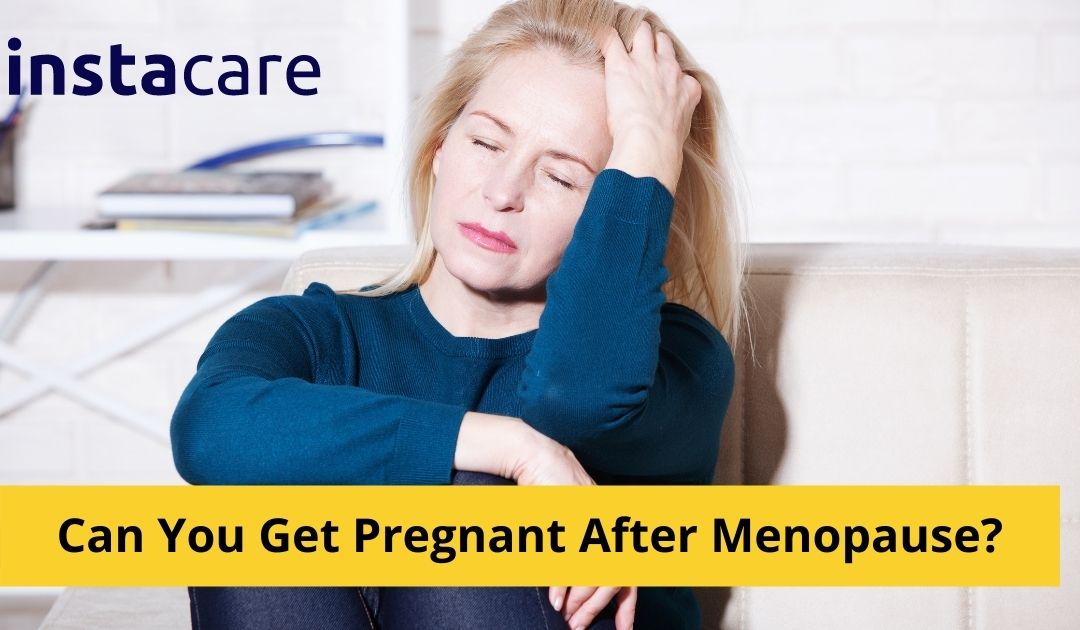Menopause occurs around 45 to 55 when ovaries stop producing eggs and less estrogen hormone in your body.
But can you get pregnant after menopause? And what are the risks involved in getting pregnant later in life? Understanding the effects of menopause on fertility can help people make plans for having children or avoiding pregnancy.
Sign Of Menopause
The sign of menopause or perimenopause includes night sweats, mood, skin, and body changes, spotting irregular menstrual periods, or no menstrual periods.
Menopausal changes start in your late 30s and 40s, so if you’re experiencing any changes in your body, it could mean your body is preparing for menopause. But if you’re thinking of getting pregnant in your 40s, it is still possible, but the chances are less.
Can You Get Pregnant During Menopause?
Fertility declines with age; the older you get, you’re less likely to become pregnant. If you’re under 50 years old and haven’t had any periods for 2 years and want to get reliable pregnant, contraception should be used. And over 50 years old, you should use contraception after 12 months of your last period. You won’t be able to get pregnant at the age of 55 by using contraception because you will become menopausal at this age.
Can Menopause Be Reversed?
Menopause can be reversed by restoring the activity in the ovaries of perimenopausal women, but only temporarily. Research has shown that postmenopausal women retrieve a menstrual cycle within three months when treated with PRP (platelet-rich plasma) of their own. PRP contains growth factors and hormones.
How To Reverse Menopause And Get Pregnant?
Menopause can be reversed by:
Using contraception
Hormonal contraception affects your hormone levels and can hide the symptoms of perimenopause. Contraceptive pill and contraceptive vaginal ring can be used if you are over the age of 40 years and have no medical problems, have a healthy weight, and don’t smoke. However, the other type of contraception is when you reach 50. The progesterone pill can be used until you reach the age of 55, after which there is no need to use contraception.
Hormone Replacement Therapy (HRT)
The Mirena coil can be used during menopause; the coil is inserted at age 45 or can be used as contraception up to the age of 55 to reverse menopause and as a part of hormone replacement therapy (HRT).
Other choices will include the contraceptive implant, which is used until menopause. Non-hormonal options include a copper intrauterine device and condoms.
When To Take Pregnancy Test During Menopause
Many symptoms of menopause are very similar to pregnancy. If you get pregnant, you experience symptoms like mood swings, problems in sleeping, fatigue, and headaches, and the same will also happen in menopause. If you’re sexually active and experience symptoms of sickness, vomit, and pee frequently, then it’s important to do a pregnancy test. Home pregnancy tests are available that measure the levels of the pregnancy hormone human chorionic gonadotropin in your pee. If it is present in higher levels, then you’re pregnant.
View More: What Are the Consequences of Ectopic Pregnancy
What Are The Risks Of Perimenopausal Pregnancy?
While there are always some risks involved in pregnancy during perimenopause, pregnant women during perimenopause are considered to be high-risk for a variety of complications and should be monitored more closely by doctors. It’s highly recommended to talk with your doctor if you plan for pregnancy in your perimenopausal years because there is a 50% chance of miscarriage for women over the age of 40. Pregnancy after 35 is classified as a late pregnancy because it carries certain risks. These include:
- The late pregnancy results in pregnancy-related high blood pressure and diabetes
- An increased chance of cesarean section.
- Complications in delivery.
- Genetic disorders in the baby.
Fertility Of Women As They Age
A woman is most fertile in her 20s, and as she ages, her ability to reproduce decreases, especially when she reaches the age of 35. Here are some stats of pregnancy after menopause.
A healthy woman at the age of 30 has a 20% chance of getting pregnant.
By the age of 40, a woman has less than a 5% chance of getting pregnant.
By the age of 51, most women will have started menopause and will not conceive or have a successful pregnancy.
Conclusion
After menopause, you may be able to carry a baby through hormone therapies and IVF. But it has a lot of risks. Other than IVF, if you don’t get periods for a year, you can consider yourself beyond your childbearing years.
Please book an appointment with the best Gynecologist in Lahore, Karachi, Islamabad, and all major cities of Pakistan through InstaCare, or call our helpline at 03100002273 to find the verified doctor for your disease.












